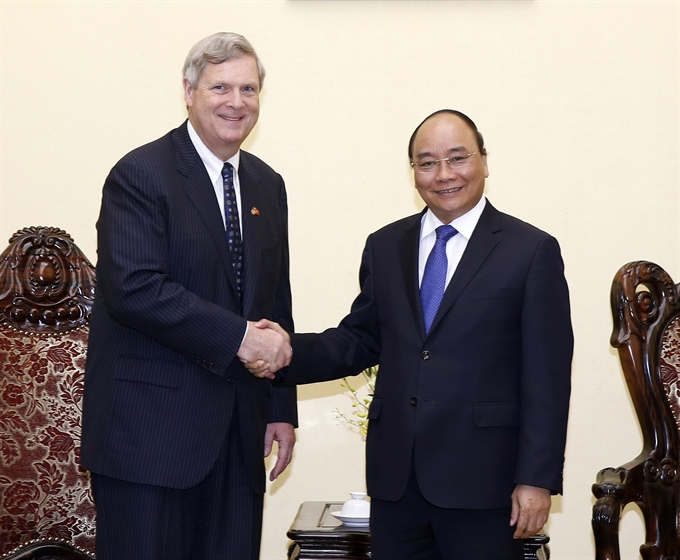 Politics & Law
Politics & Law

Prime Minister Nguyễn Xuân Phúc hosted a reception in Hà Nội yesterday for US Secretary of Agriculture Thomas Vilsack, during which he hoped the US would step up activities to support Việt Nam in agricultural production and climate change response.
 |
| Prime Minister Nguyễn Xuân Phúc (right) receives US Secretary of Agriculture Thomas Vilsack. — VNA/VNS Photo Thống Nhất |
HÀ NỘI – Prime Minister Nguyễn Xuân Phúc hosted a reception in Hà Nội yesterday for US Secretary of Agriculture Thomas Vilsack, during which he expressed his hope that the US would step up support for Việt Nam in agricultural production and climate change response.
The Government leader spoke highly of the secretary’s talks with Vietnamese Minister of Agriculture and Rural Development Cao Đức Phát, where they agreed to boost bilateral trade in agriculture, fishery and forestry.
He told the guest that agriculture was a large part of the country’s economic structure with more than half of the population involved in this field. Việt Nam wants US assistance in improving food quarantines and clean production.
Phúc asked the US to allow the import of Vietnamese mangos and starfruits soon and continue supporting the export of Việt Nam’s tra and basa fish to the US market.
The Vietnamese Government submitted the Trans-Pacific Partnership Agreement to the National Assembly for ratification, he said, believing that the agreement, once effective, will facilitate more co-operation between the two countries.
He also said that the Vietnamese Government and people are expecting to welcome US President Barack Obama to Việt Nam in May.
The guest said he was impressed by Việt Nam’s development achievements.
Sympathising with the losses caused by drought and saltwater, he affirmed that his country was willing to send experts to Việt Nam to exchange experience in adapting to climate change and dealing with drought and saline intrusion.
Vilsack continued by saying that the US would create favourable conditions to expand its market for Vietnamese agricultural products.
He suggested both sides consider removing more trade barriers to improve the effectiveness of bilateral co-operation.
Agro-forestry-fisheries co-operation
Earlier yesterday, Minister of Agriculture and Rural Development Cao Đức Phát and US Secretary of Agriculture Vilsack held talks in Hà Nội to enhance collaboration in agriculture, forestry and seafood between the two countries.
According to the Vietnamese ministry, the country’s agro-forestry-fisheries exports to the US still face a number of difficulties and unfair treatment. The procedures to grant an export licence for Vietnamese fruit to the market are complicated, costly and time-consuming. So far, only four kinds of Vietnamese fruit, namely dragon fruit, rambutan, longan and lychee are licensed to enter the US, but with high export costs.
Việt Nam has sent a draft report on the probable risk assessment (PRA) of mango and star apple to the US Department of Agriculture (USDA)’s Animal and Plant Health Inspection Service (APHIS) and proposed APHIS hand over the inspection of fruit irradiation to the Vietnamese ministry’s Plant Protection Department. Việt Nam has effectively coordinated with the US in this field since 2008.
The US Environmental Protection Agency (EPA) and the US Food and Drug Administration (FDA) are imposing zero maximum residue limits (MRL) for some unregistered drugs in the US, though these drugs are allowed for use in other countries. This has caused difficulties for Vietnamese exporters. Also, Vietnamese farm producers have to follow the food safety regulations from different US states.
Regarding seafood, Vietnamese shrimp and tra fish exported to the US last year received unfair treatment and continuously experienced anti-dumping and anti-subsidy lawsuits, which significantly affected the trade ties between the two countries as well as the jobs and income of millions of Vietnamese farmers and businesses.
The USDA has ruled for the establishment of an inspection programme for Siluriformes fish, including Vietnamese tra and basa fish, which came into effect on March 1, 2016. Accordingly, the export countries have a transitional period of 18 months (until August 31, 2017) to adjust their production systems in line with the new US regulations.
The implementation of the programme within 18 months is difficult for Việt Nam due to the country’s significant difference from the US in production conditions and level of development. This might interrupt trade activities and affect millions of Vietnamese farmers and exporters. Therefore, Vietnam proposed the US extend the time limit for the country to meet the programme’s regulations.
The Vietnamese Ministry of Agriculture and Rural Development hopes to strengthen co-operation with the US in smart agriculture to cope with climate change, Phát said, adding that the US was expected to help the Southeast Asian country enhance capacity in the fields of biological and hi-tech agriculture, food hygiene and safety, and flora and fauna inspection.
He asked the US to support Việt Nam in evaluating aquatic resources and realising commitments in the environment programme under the Trans-Pacific Partnership (TPP) agreement – to which both nations are members.
Currently, the US is the second most important farm produce market for Việt Nam, after China, with an export turnover of US$5.69 billion and imports of US$1.4 billion in 2015. — VNS